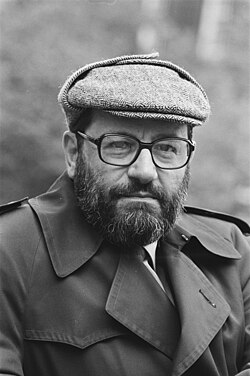Umberto Eco Quote
The Jesuits’ strategy became clear to us when we discovered Father Barruel. Between 1797 and 1798, in response to the French Revolution, he writes his Mémoires pour servir à l’histoire du jacobinisme, a real dime novel that begins, surprise surprise, with the Templars. After the burning of Molay, they transform themselves into a secret society to destroy monarchy and papacy and to create a world republic. In the eighteenth century they take over Freemasonry and make it their instrument. In 1763 they create a literary academy consisting of Voltaire, Turgot, Condorcet, Diderot, and d’Alembert, which meets in the house of Baron d’Holbach and in 1776, plot after plot, they bring about the birth of the Jacobins. But they are mere marionettes, their strings pulled by the real bosses, the Illuminati of Bavaria—regicides by vocation.
The Jesuits’ strategy became clear to us when we discovered Father Barruel. Between 1797 and 1798, in response to the French Revolution, he writes his Mémoires pour servir à l’histoire du jacobinisme, a real dime novel that begins, surprise surprise, with the Templars. After the burning of Molay, they transform themselves into a secret society to destroy monarchy and papacy and to create a world republic. In the eighteenth century they take over Freemasonry and make it their instrument. In 1763 they create a literary academy consisting of Voltaire, Turgot, Condorcet, Diderot, and d’Alembert, which meets in the house of Baron d’Holbach and in 1776, plot after plot, they bring about the birth of the Jacobins. But they are mere marionettes, their strings pulled by the real bosses, the Illuminati of Bavaria—regicides by vocation.
Related Quotes
About Umberto Eco
Eco wrote prolifically throughout his life, with his output including children's books, translations from French and English, in addition to a twice-monthly newspaper column "La Bustina di Minerva" (Minerva's Matchbook) in the magazine L'Espresso beginning in 1985, with his last column (a critical appraisal of the Romantic paintings of Francesco Hayez) appearing 27 January 2016. At the time of his death, he was an Emeritus professor at the University of Bologna, where he taught for much of his life. In the 21st century, he has continued to gain recognition for his 1995 essay "Ur-Fascism", where Eco lists fourteen general properties he believes comprise fascist ideologies.
